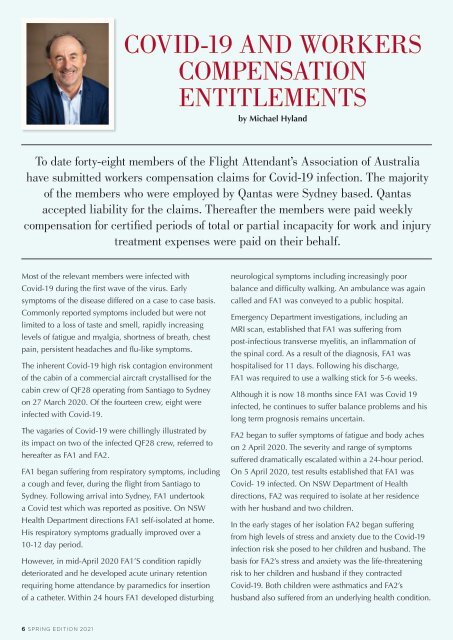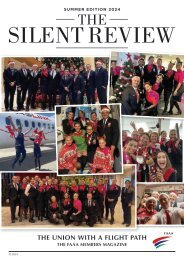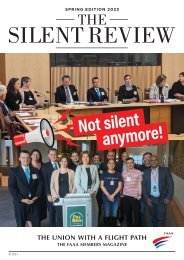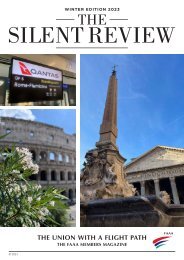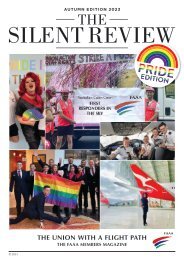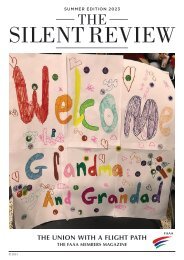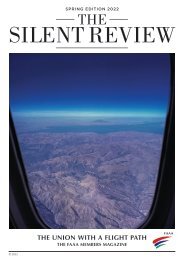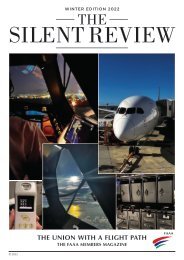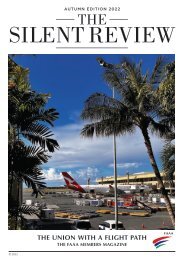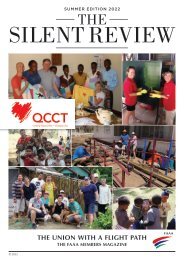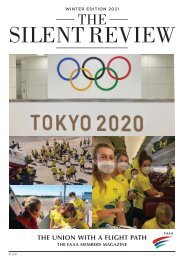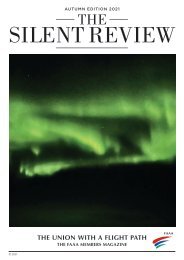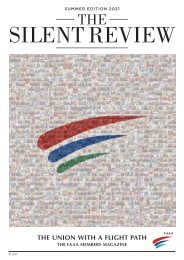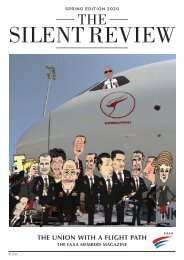THE SILENT REVIEW_SPRING EDITION 2021_WEB
You also want an ePaper? Increase the reach of your titles
YUMPU automatically turns print PDFs into web optimized ePapers that Google loves.
COVID-19 AND WORKERS<br />
COMPENSATION<br />
ENTITLEMENTS<br />
by Michael Hyland<br />
To date forty-eight members of the Flight Attendant’s Association of Australia<br />
have submitted workers compensation claims for Covid-19 infection. The majority<br />
of the members who were employed by Qantas were Sydney based. Qantas<br />
accepted liability for the claims. Thereafter the members were paid weekly<br />
compensation for certified periods of total or partial incapacity for work and injury<br />
treatment expenses were paid on their behalf.<br />
Most of the relevant members were infected with<br />
Covid-19 during the first wave of the virus. Early<br />
symptoms of the disease differed on a case to case basis.<br />
Commonly reported symptoms included but were not<br />
limited to a loss of taste and smell, rapidly increasing<br />
levels of fatigue and myalgia, shortness of breath, chest<br />
pain, persistent headaches and flu-like symptoms.<br />
The inherent Covid-19 high risk contagion environment<br />
of the cabin of a commercial aircraft crystallised for the<br />
cabin crew of QF28 operating from Santiago to Sydney<br />
on 27 March 2020. Of the fourteen crew, eight were<br />
infected with Covid-19.<br />
The vagaries of Covid-19 were chillingly illustrated by<br />
its impact on two of the infected QF28 crew, referred to<br />
hereafter as FA1 and FA2.<br />
FA1 began suffering from respiratory symptoms, including<br />
a cough and fever, during the flight from Santiago to<br />
Sydney. Following arrival into Sydney, FA1 undertook<br />
a Covid test which was reported as positive. On NSW<br />
Health Department directions FA1 self-isolated at home.<br />
His respiratory symptoms gradually improved over a<br />
10-12 day period.<br />
However, in mid-April 2020 FA1’S condition rapidly<br />
deteriorated and he developed acute urinary retention<br />
requiring home attendance by paramedics for insertion<br />
of a catheter. Within 24 hours FA1 developed disturbing<br />
neurological symptoms including increasingly poor<br />
balance and difficulty walking. An ambulance was again<br />
called and FA1 was conveyed to a public hospital.<br />
Emergency Department investigations, including an<br />
MRI scan, established that FA1 was suffering from<br />
post-infectious transverse myelitis, an inflammation of<br />
the spinal cord. As a result of the diagnosis, FA1 was<br />
hospitalised for 11 days. Following his discharge,<br />
FA1 was required to use a walking stick for 5-6 weeks.<br />
Although it is now 18 months since FA1 was Covid 19<br />
infected, he continues to suffer balance problems and his<br />
long term prognosis remains uncertain.<br />
FA2 began to suffer symptoms of fatigue and body aches<br />
on 2 April 2020. The severity and range of symptoms<br />
suffered dramatically escalated within a 24-hour period.<br />
On 5 April 2020, test results established that FA1 was<br />
Covid- 19 infected. On NSW Department of Health<br />
directions, FA2 was required to isolate at her residence<br />
with her husband and two children.<br />
In the early stages of her isolation FA2 began suffering<br />
from high levels of stress and anxiety due to the Covid-19<br />
infection risk she posed to her children and husband. The<br />
basis for FA2’s stress and anxiety was the life-threatening<br />
risk to her children and husband if they contracted<br />
Covid-19. Both children were asthmatics and FA2’s<br />
husband also suffered from an underlying health condition.<br />
6 <strong>SPRING</strong> <strong>EDITION</strong> <strong>2021</strong>


